Exclusive interview with Jennifer Thompson, Iridologist and Founder of Healthy Bliss:
Q: Would you start off by tell us a bit about your background?
Jennifer: My background… well I have a pretty standard American background which means I grew up in the US, graduated university as an engineer and then started working in the corporate world. In my mid-twenties, I basically realized that I wanted to do more in life, so I saved money, quit my job, sold everything I owned and started doing my ‘bucket list’ as they say.
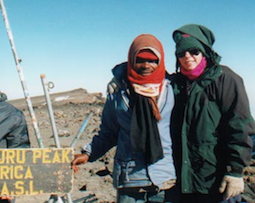
On the summit of Mt. Kilimanjaro, 1996
I worked as a park ranger at Zion National Park in the US, I traveled to Nepal, South Africa, Kenya, Tanzania and Morocco.
I thru-hiked the entire 3,500km-long Appalachian Trail and then I set off with my bicycle to SE Asia, New Zealand and Australia.
I was on an ‘existential stream-of-consciousness’ round-the-world adventure.’ Hahaha…maybe I am still on it now!
Q: How did you become interested in changing your diet and eating a predominantly raw, plant-based diet?
Jennifer: I became a vegetarian at the age of 21 and at that time it was mostly for environmental reasons. I was completing my undergraduate degree in Environmental Systems Engineering at the time, and when I really understood the impact that a meat-based diet has on the sustainability of the earth, it was an easy choice to give up meat.
In my twenties, I was eating what I thought to be a healthy vegetarian diet, but I now know that I was relying too heavily on wheat and dairy. Compared to my friends, I was the ‘rabbit’ eater but the foods I was eating were not high-mineral content foods. I also did not think to buy organic and I never really looked at food labels. Still, I was not eating McDonalds or fast foods but I ate salads, fruit and also pizza, veggie burgers and potato chips.
Later, when I left the corporate world and started my travel adventures, I did not give much thought to my level of sport compared to what I was eating. I thought I was young and fit and invincible and I was! I cycled 100 km a day and hiked 35 km a day for years! And I could eat whatever I wanted because I was burning everything off, and I never thought I was doing anything wrong. Until I got sick.
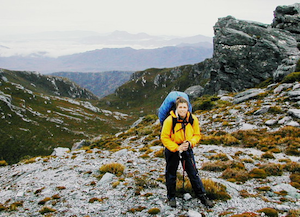
Western Arthurs, Tasmania Australia, 2004
It was when I was cycling up the east coast of Australia that I started to develop an extremely itchy rash. The rash developed quickly and also got worse quite quickly too. Eventually after another few weeks on the bike, I decided to stop cycling and try to sort out the problem. I wound up staying in Australia for over 2 years and at it’s worse the rash covered my entire body from head to toe! After 2 years of suffering, I pinpointed my problem to one food additive, one E number, which is a salty, savory additive used in many foods (every many ‘healthy’ foods like seaweed flavored rice crackers). When I removed that additive from my diet, the rash slowly disappeared. I had been to every expert doctor I could find in Australia and none of them were able to help me. It sickened me to think I had wasted so much time being so itchy and miserable when it was so unnecessary. I decided then that if one additive could do that to me then I didn’t want to eat any of them. It was shortly after that I started the raw plant-based food diet.
The full story is available on my website at www.healthybliss.net, but just so you know the additive is called ‘ribonucleotide’ and the rash is called the ‘ribo rash.’ The E number can be listed as 635, 627 or 631.
Q: How do you feel now compared to before the plant-based diet?
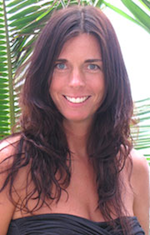
Jennifer Healthy, 2011
Jennifer: I feel like a different person.
When I look at photos of myself now, I look younger, brighter, vibrant and more healthy than I ever did before.
My energy levels are much higher now, I feel lighter in my mind and my energetic vibration, I feel more in alignment with the earth and with nature and it just feels right.
Q: Was there something you could not do before the raw, plant-based diet?
Jennifer: I could not see, feel or understand my connection to all living beings. Sounds heavy, but it’s true!
Q: I know that you have passion in a number of areas such as Iridology, detoxification and toxic chemicals. What are some other areas that you are interested in?
Jennifer: Outside of the health arena? Live acoustic and blues, travel and culture, hiking and camping and web design and SEO (haha – that’s the engineer in me!) Inside the health arena? Crystal energy and vibrational healing, water fasting and meditation and of course eating live, organic raw foods made with loving intention!!
Q: Would you tell us area by area about those specific interests maybe starting with Iridology and then toxic chemicals and so on?
Jennifer: Being a Systems Engineer allows me to really appreciate Iridology as a science.
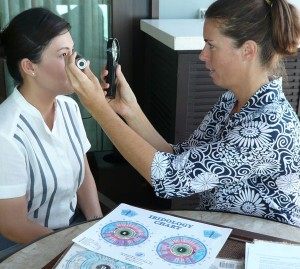
Jennifer at the Four Seasons in Koh Samui
One of my eyes has 2 distinct different colors and I was always curious about it. That is what first led me to going to an Iridologist while in Australia. She told me things there was no way she could know, and I was fascinated. From that point on, I wanted to learn more. Because I already had such a strong background in detox and cleansing, it seemed natural that I would study Iridology and combine the 2 together, which I did. I am now a fully trained Certified Comprehensive Iridologist through the IIPA (International Iridology Practitioner’s Association).
With the food additives, I’ve developed a growing client base of people from all over the world who are suffering in many ways and have also gone undiagnosed by doctors. They either find me through my website or by word of mouth. Usually when someone tells me their symptoms, I will ask them a series of questions about their diet and in less than 5 minutes I can determine the exact food that is causing their problem. I’ve had children as young as 2 years old and parents who have gone to every expert in their country with no answers until they found me. It’s pretty amazing how simple it can be, but if you never isolate your foods, you would have no way to find the problem.
Many additives have a delayed reaction time as well, which means you can eat something on Monday night and have the reaction on Wednesday morning. If you did not have some expert guidance, you would never figure it out. The other issue that becomes a problem is to learn how to find these chemicals on food labels, because legally they are allowed to ‘hide’ them under other names such as ‘yeast extract.’ Once you learn, it’s then a matter to avoid them. For me, I prefer to eat ‘real food’ i.e. a raw food plant-based diet.
Q: What is the most common toxic chemical you have come across that affects most of the people you work with?
Jennifer: MSG or mono-sodium glutamate. Well, I think there are many bad ones, but I have to say the ‘worst’! I think MSG is one of the worst because of the ‘perception’ that is it harmless and natural and also because people have no idea that it is hidden in so many ‘so-called’ healthy foods. Just watch my youtube clips and you will be amazed. I think MSG is a huge contributing factor to depression, insomnia, headaches, fatigue, irritability, adhd and low immune function.
Q: Without naming any names, referring to peanut butter, I have a friend that buys generic peanut butter, which contain tons of chemical ingredients because it is cheaper, over a brand that only contains roasted peanuts and maybe two more ingredients. How important is it really that people choose processed items which do not contain the chemicals that you are aware of?
Jennifer: I think it’s the difference between giving your child a cup of bleach or a cup of water. Dis-ease always starts within. Why not keep the body as clean as possible? When you can make a better choice, do it!
Q: What are the effects of these chemicals, and can an athlete sweat it out and be void of their effects?
Jennifer: No one gets the ‘Get out of Jail Free Card’ with chemical additives. With athletes, they may be able to sweat out some toxins, but the liver still has to do the added work. That means less work for peak performance (i.e. immune function), in the same way that your car will run less efficiently on cheaper fuel. Look at Lance Armstrong as an example. I don’t know what he ate before he got cancer, but I am guessing it was a diet high in refined sugars. It is widely known that refined sugar feeds cancer. With athletes who eat processed sugar, is all the sugar really burned, or is there a residual effect? And what about chemical additives then? I don’t even like to think about it!
Q: What warning would you give to people that do not choose organic?
Jennifer: Long-term you could be setting yourself up for mineral deficiencies.
Q: Do you recommend people make a diet change cold turkey, or do you recommend they take it at a slow pace? I have heard that changing from a Standard American Diet (SAD) to a raw, plant-based diet should be handled as people treat any other addiction. Please comment on that.
Jennifer: When you change your diet, your lifestyle also has to change. So be prepared for that. Everyone is different with his or her approach to change – I believe in taking a person one step above where he is at, not forcing anyone into cold turkey, but I also support them if that is what they choose. You didn’t get to where you are overnight; so don’t expect to get out of it overnight either. Usually all or nothing takes people back to all or nothing.
Q: Who are some of your greatest influences?
Jennifer: I am influenced by success stories! When I receive an email or a thank you note from a client who has achieved their health goals, wow – is that inspiration for the day or what! It’s what drives me to keep going. My personal influences are the Natural Hygienists such as Arnold Ehret or Normal Walker – the people who really laid the groundwork for what a lot of us are doing today.
Q: How do you manage stress?
Jennifer: Haha, good question! I turn the phone off every night from 9pm to 9am.
Q: How about exercise? Do you exercise? What is your daily exercise regiment?
Jennifer: Usually I either walk 5km, run 5km, swim for 40 minutes or do stretching and weights for 40 minutes. I try to exercise every day.
Q: Do you have any projects planned for the near future?
Jennifer: I am working on a series of educational DVDs and books. The first one will be released in December 2011 and will be sold online at www.healthybliss.net.
Q: Is there anything else that we left out that you might want to mention?
Jennifer: Yes! As Fred Bisci says, ‘ Don’t talk about food all the time – it’s boring!’ I love that quote, because it reminds me to have balance in my life. It is just as important to make time for friends, family and love as much as it is to eat well, so remember to keep it all in perspective. Healing has to occur on every level and when you go to all levels, the rewards is…well, healthy bliss!
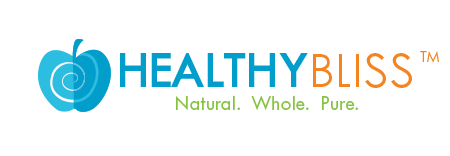
Leave a Reply
Want to join the discussion? Please be respectful of other participants in the conversation and keep your comments respectful, friendly and relevant. Differences of opinion are welcome, but trolling and abuse of other commentators and the Healthy Bliss team is not and will result in blacklisting. Thank you for keeping this a bully-free zone!